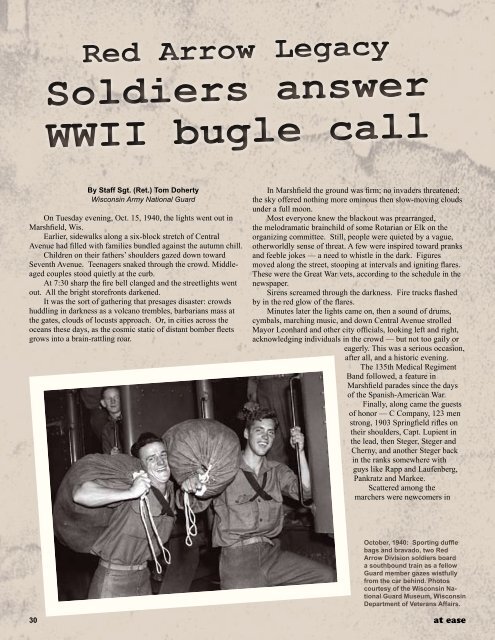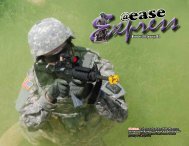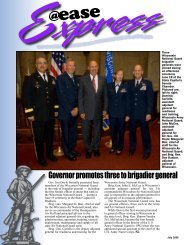At Ease - Wisconsin National Guard Department of Military Affairs
At Ease - Wisconsin National Guard Department of Military Affairs
At Ease - Wisconsin National Guard Department of Military Affairs
You also want an ePaper? Increase the reach of your titles
YUMPU automatically turns print PDFs into web optimized ePapers that Google loves.
Red Arrow Legacy<br />
Soldiers answer<br />
WWII bugle call<br />
By Staff Sgt. (Ret.) Tom Doherty<br />
<strong>Wisconsin</strong> Army <strong>National</strong> <strong>Guard</strong><br />
On Tuesday evening, Oct. 15, 1940, the lights went out in<br />
Marshfield, Wis.<br />
Earlier, sidewalks along a six-block stretch <strong>of</strong> Central<br />
Avenue had filled with families bundled against the autumn chill.<br />
Children on their fathers’ shoulders gazed down toward<br />
Seventh Avenue. Teenagers snaked through the crowd. Middleaged<br />
couples stood quietly at the curb.<br />
<strong>At</strong> 7:30 sharp the fire bell clanged and the streetlights went<br />
out. All the bright storefronts darkened.<br />
It was the sort <strong>of</strong> gathering that presages disaster: crowds<br />
huddling in darkness as a volcano trembles, barbarians mass at<br />
the gates, clouds <strong>of</strong> locusts approach. Or, in cities across the<br />
oceans these days, as the cosmic static <strong>of</strong> distant bomber fleets<br />
grows into a brain-rattling roar.<br />
In Marshfield the ground was firm; no invaders threatened;<br />
the sky <strong>of</strong>fered nothing more ominous then slow-moving clouds<br />
under a full moon.<br />
Most everyone knew the blackout was prearranged,<br />
the melodramatic brainchild <strong>of</strong> some Rotarian or Elk on the<br />
organizing committee. Still, people were quieted by a vague,<br />
otherworldly sense <strong>of</strong> threat. A few were inspired toward pranks<br />
and feeble jokes — a need to whistle in the dark. Figures<br />
moved along the street, stooping at intervals and igniting flares.<br />
These were the Great War vets, according to the schedule in the<br />
newspaper.<br />
Sirens screamed through the darkness. Fire trucks flashed<br />
by in the red glow <strong>of</strong> the flares.<br />
Minutes later the lights came on, then a sound <strong>of</strong> drums,<br />
cymbals, marching music, and down Central Avenue strolled<br />
Mayor Leonhard and other city <strong>of</strong>ficials, looking left and right,<br />
acknowledging individuals in the crowd — but not too gaily or<br />
eagerly. This was a serious occasion,<br />
after all, and a historic evening.<br />
The 135th Medical Regiment<br />
Band followed, a feature in<br />
Marshfield parades since the days<br />
<strong>of</strong> the Spanish-American War.<br />
Finally, along came the guests<br />
<strong>of</strong> honor — C Company, 123 men<br />
strong, 1903 Springfield rifles on<br />
their shoulders, Capt. Lupient in<br />
the lead, then Steger, Steger and<br />
Cherny, and another Steger back<br />
in the ranks somewhere with<br />
guys like Rapp and Laufenberg,<br />
Pankratz and Markee.<br />
Scattered among the<br />
marchers were newcomers in<br />
October, 1940: Sporting duffle<br />
bags and bravado, two Red<br />
Arrow Division soldiers board<br />
a southbound train as a fellow<br />
<strong>Guard</strong> member gazes wistfully<br />
from the car behind. Photos<br />
courtesy <strong>of</strong> the <strong>Wisconsin</strong> <strong>National</strong><br />
<strong>Guard</strong> Museum, <strong>Wisconsin</strong><br />
<strong>Department</strong> <strong>of</strong> Veterans <strong>Affairs</strong>.<br />
30 at ease





